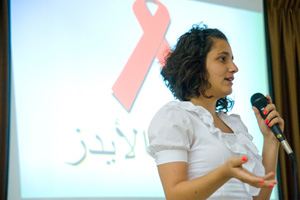By Christopher J. Leitten (CI Intern—Geneva, Switzerland) and Msgr. Robert J. Vitillo

Spiritual and Pastoral Care is highlighted at the Catholic Pre-Conference on HIV and AIDS held in Melbourne, Australia. Credit: Caritas
To effectively address the “total pain” that a person is suffering, his or her spiritual pain must also be addressed. This was the message of Maryknoll Father Richard W. Bauer, a missionary in Namibia, during a Catholic pre-conference on HIV and AIDS held in Melbourne, Australia. At the event on Saturday, 19 July 2014, Father Bauer emphasised the spiritual needs of people suffering from HIV. In a presentation entitled “Providing Spiritual and Pastoral Care In a Pluralistic Health Care Setting”, Fr. Bauer underlined that wellness is not simply the absence of disease, but is rather a dynamic state of complete physical, mental, spiritual, and social well-being.
Fr. Bauer has been involved in ministry and support to people living with or affected by HIV since the early 1980s. He noted that in today’s world, health care workers often tend to focus exclusively on their patients’ physical needs. Fr. Bauer stressed further that it is through spirituality that all of humanity seeks “ultimate meaning”.
While on the surface it may seem that spiritual and bodily health are separate, Fr. Bauer insisted that they are intertwined. Moreover, understanding a person’s spiritual grounding is crucial to understanding how someone deals with illness, treatment, death, and bereavement. Addressing the spiritual needs of patients helps to empower them and to facilitate quality treatment tailored to the specific needs and desires.
Fr. Bauer outlined four key steps in Spiritual Assessment: Faith, Importance, Community, and Action (FICA). In his presentation, he demonstrated how the FICA Toolkit (developed by Dr. Christina M. Puchalski of the George Washington Institute for Spirituality and Health [USA]), could be used to conduct an effective “spiritual assessment” of those experiencing health challenges. This type of evaluation and care can be provided to all patients, regardless of their respective religious beliefs. Fr. Bauer cautioned that spiritual assessment must be conducted with utmost care, respect, and that most importantly, care workers must make themselves available to the patient in order to listen, learn, and help.
Finally, Fr. Bauer clarified the difference between “cure” and “healing”. He pointed out that a cure implies an absolute goal–to end the disease–and is carried out with an “expected, narrowly defined destination and with traditional healthcare” by means of “diagnosis, prognosis, and treatment”.
Healing, however, focuses more on whole-person care and is viewed more in the context of a journey. Healing also may involve the removal of pathology but, on the other hand, might require helping the person live and die peacefully with an illness that cannot be cured. In contrast to health care focused exclusively on a cure, said Fr. Bauer, healing always aims to provide hope.
